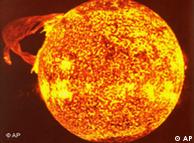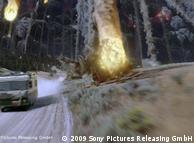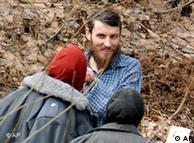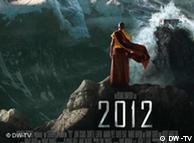Alternative Religions | 21.12.2009
Emmerich's "2012" film highlights growing interest in the end of the world
What will you be doing on December 22, 2012? Most people assume they will be worrying about the fact that they only have two more shopping days before Christmas. But if a growing number of other people are to be believed, none of us will have anything to worry about - because we won't be here. Any of us.
December 22, 2012 could be the day after the end of the world. According to certain interpretations of ancient prophecies, a series of cataclysmic or transformative events will occur on or around December 21, 2012, the end-date of the 5,125-year-long Mayan calendar.
The Hollywood blockbuster "2012," directed by German director Roland Emmerich, has brought a version of the Mayan prophesy to the masses, but the disaster flick paints a very bleak picture of 2012.
The ancient Maya never explained in detail what would happen when their calendar reached the final day. Some people joke that they just ran out of stone tablets. Optimistic seers predict that, rather than meeting a messy end, humanity will enter a new level of consciousness - a meta- rather than physical change.
 Bildunterschrift: Großansicht des Bildes mit der Bildunterschrift: Violent sun storms are a popular part of prophecies
Bildunterschrift: Großansicht des Bildes mit der Bildunterschrift: Violent sun storms are a popular part of prophecies
But believers in apocalyptic prophesy have seized upon December 21, 2012 as the date for humanity's Judgment Day. Despite having their beliefs rejected by various schools of scientific thought, end-times soothsayers subscribe to the Emmerich version of events and remain convinced that the majority of the human race will have checked out by the 22nd.
Theories on the nature of the predicted disaster are legion. Some believe a cosmic alignment of planets will position earth in the direct firing line of some immense galactic energy burst which will crack the plant like a nut. Others believe a mysterious Planet X will return from the far reaches of space on an orbit which will wreak havoc on earth - or even collide with it. Some say it will be our own fault and that the CERN particle accelerator will create a black hole that will swallow up the planet, while traditionalists hedge their bets on the rise of the Antichrist.
Doomsday cults preparing for 2012
For every cataclysm, there seems to be a group, movement or sage who has based its teachings and lifestyle on preparing for the worst. One of them is the New Global Trust, based near Antwerp.
According to Sandrine Mathen from the Belgian Federal Center of Information on Harmful Sects (CIASON), the New Global Trust envisages a post-apocalyptic world virtually destroyed by the effects of violent sun storms. The Trust believes that only those willing and strong enough to start from zero will survive and only those deemed suitable will be brought into its secretive "survival group" to begin the painfully slow business of rebuilding civilization.
Another group recruiting potential survivors is led by Belgian astronomer and end-times author Patrick Geryl, who states that 2012 will mark a physical catastrophe and immense disaster for humankind. Again, Geryl's main argument is that "upheavals in the sun's magnetic fields will generate gigantic solar flares that will affect the polarity of the entire earth," causing the earth's magnetic fields to reverse at once with disastrous effects.
Geryl is now focusing on establishing a survival group. Only those with money and resources will be permitted to this group, which is planning to relocate to concrete bunkers high in the mountains of Africa.
 Bildunterschrift: Cult experts fear groups may take their own lives to avoid the potential horrors of 2012 - like the lava explosions shown in "2012"
Bildunterschrift: Cult experts fear groups may take their own lives to avoid the potential horrors of 2012 - like the lava explosions shown in "2012"
Concerns over possible pre-emptive deaths
At least at the moment, these groups appear to be concentrating on surviving the possible tribulations of 2012. Historical evidence suggests there could be others which may not wait for the end of the world before shaking off the collective mortal coil, instead choosing to pre-empt the coming apocalypse by voluntarily - or forcibly - taking their own lives.
Groups that set an apocalyptic end-date and then kill themselves as it dawns are rare, but those which do inevitably attract mass media attention.
"The followers of the Restoration of the Ten Commandments of God in Uganda believed that death was the only way to ascend to heaven," George Chryssides, an honorary research fellow in contemporary religion at the University of Birmingham, told Deutsche Welle.
"Their leader predicted that the world would end on December 31, 1999, but when this failed to materialize, a new date was set for the following April. Anywhere between 500 and 1,000 people died the following year when the church they were in was bolted shut from the inside and set on fire. It's still unclear though whether this was a suicide linked to the end-date or a murderous event to cover up suspected crimes," added Chryssides.
The case in Uganda highlights one of the major downsides of leading a group which has a definite apocalyptic end-date: what to tell your followers when nothing happens.
 Bildunterschrift: Those living on the Californian coast are among those hoping Roland Emmerich is wrong
Bildunterschrift: Those living on the Californian coast are among those hoping Roland Emmerich is wrong
The day after the end of the world
So what will happen if the doomsday followers wake up on December 22, 2012 to find that humanity is still going strong and the world remains intact?
"Groups have two options," said Chryssides, "To re-calculate the date or to 'spiritualize' it."
He was witness to the end-time event of a group called Solara, two decades ago in the UK. They predicted "the Opening of the Gate" and set time and date for when it would occur.
"Nothing at all happened," said Chryssides, "but the leader announced that 'the Gate is open,' and everyone seemed convinced that something important had taken place. This is a prime example of how a group can 'spiritualize' its predictions: If nothing appears to happen at a physical level, then it must be happening at some spiritual one."
When a prophecy fails, some followers just leave the group, said Suzanne Newcombe from INFORM, the London-based Information Network Focus on Religious Movements. "Sometimes groups choose another date for the fulfillment of the prophecy if it is accepted that something was incorrect in their original calculations or how signs were interpreted."
Newcombe also said that groups sometimes take the failure of an apocalyptic prophecy to materialize as a sign that their combined actions and commitment averted the impending disaster. Or, in the case of a positive prophecy, that the believers may not have been "good enough" to create a better world.
Getting it wrong
Chryssides added that it's very rare for a group's leader to apologize and admit a mistake was made in the prophecy.
"This happened once in the Watch Tower movement, in 1925, when leader Joseph Franklin Rutherford predicted the return of the Patriarchs - or Old Testament leaders - in that year," Chryssides said. "They were predicted to rise from their graves. Rutherford even bought a house for them to live in. This prediction was too physical and specific to be able to be spiritualized, and when pressed he admitted candidly that he was wrong - although he still entertained a belief that they would some day return."
In a more recent case, Pyotr Kuznetsov, a self-declared prophet and leader of the True Russian Orthodox Church, predicted that the end of the world would come in the spring of 2007 and sent his followers underground to wait for the doomsday. When that day passed, he found himself trying to change the minds of those he himself had brainwashed.
 Bildunterschrift: Großansicht des Bildes mit der Bildunterschrift: Kuznetsov got his date wrong but his followers stayed put
Bildunterschrift: Großansicht des Bildes mit der Bildunterschrift: Kuznetsov got his date wrong but his followers stayed put
"When Kuznetsov realized he was wrong about doomsday, he admitted his mistake and tried to convince them to leave their hideout," said CIAOSN's Sandrine Mathen. "Members of the group refused, saying that the situation would only end with the apocalypse."
His followers slowly emerged from the cave over the following months after a siege by Russian authorities, while Kuznetsov tried to commit suicide and was hospitalized.
Ancient prophesies, scientific theories and astronomical projections can all be spun to either support or debunk beliefs about how and when we make our final departure. Whatever you believe, the fact is that the world still exists and those who chose doomsday dates in the past have all been proven wrong. Only time will tell whether we'll all still be here on December 22, 2012 - on the day after the end of the world.
Author: Nick Amies
Editor: Kate Bowen


No comments:
Post a Comment